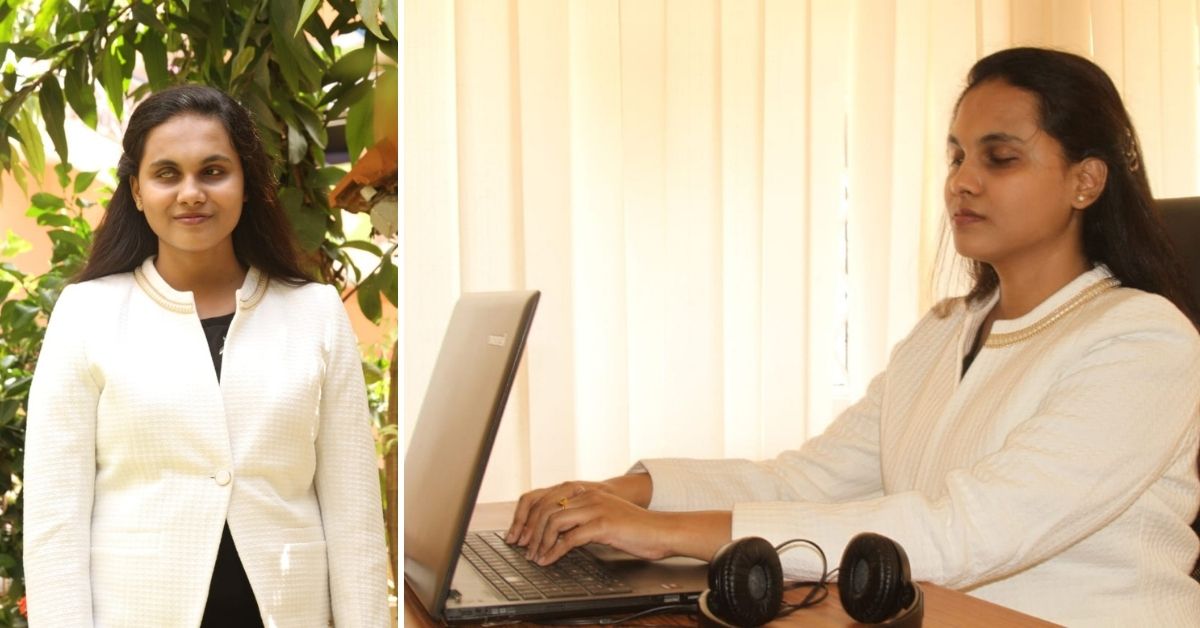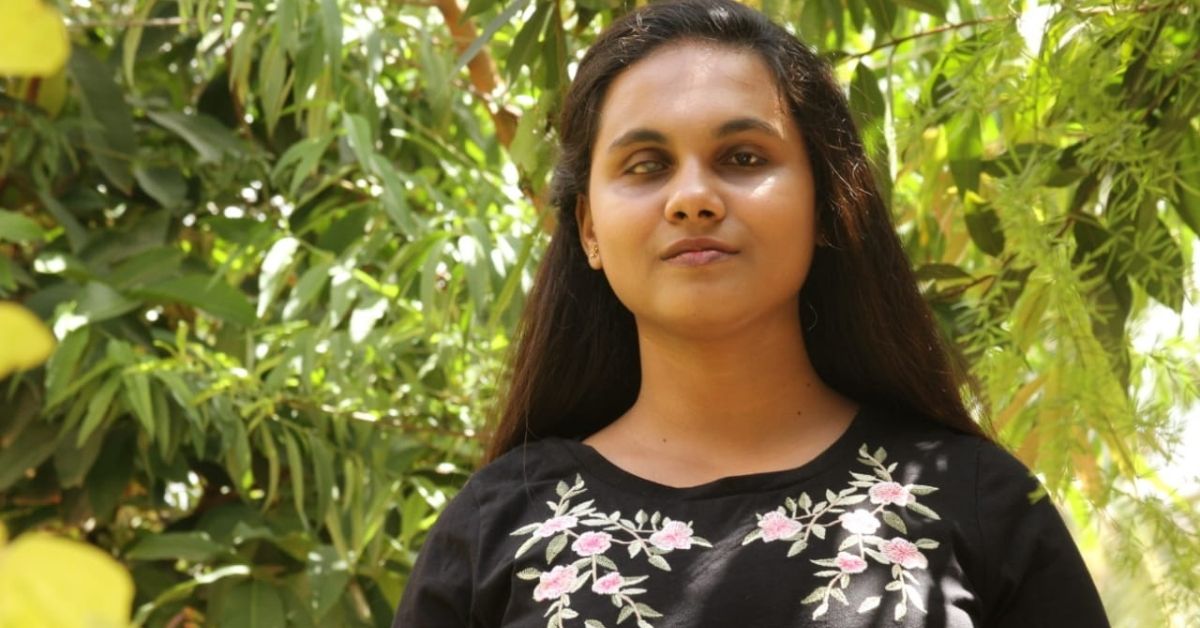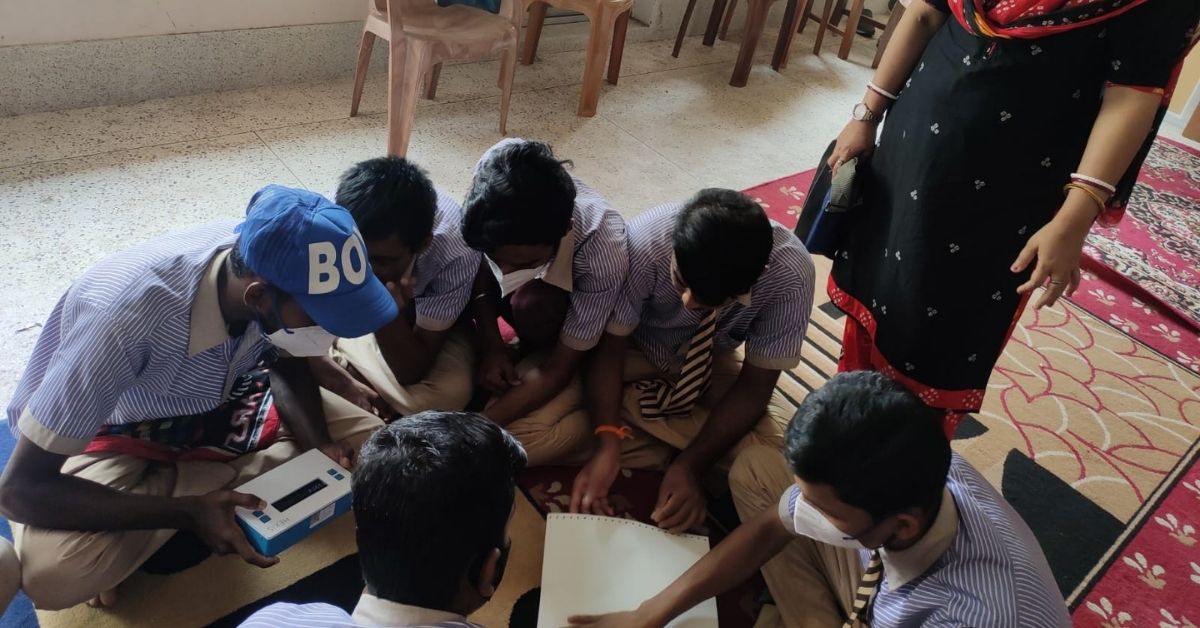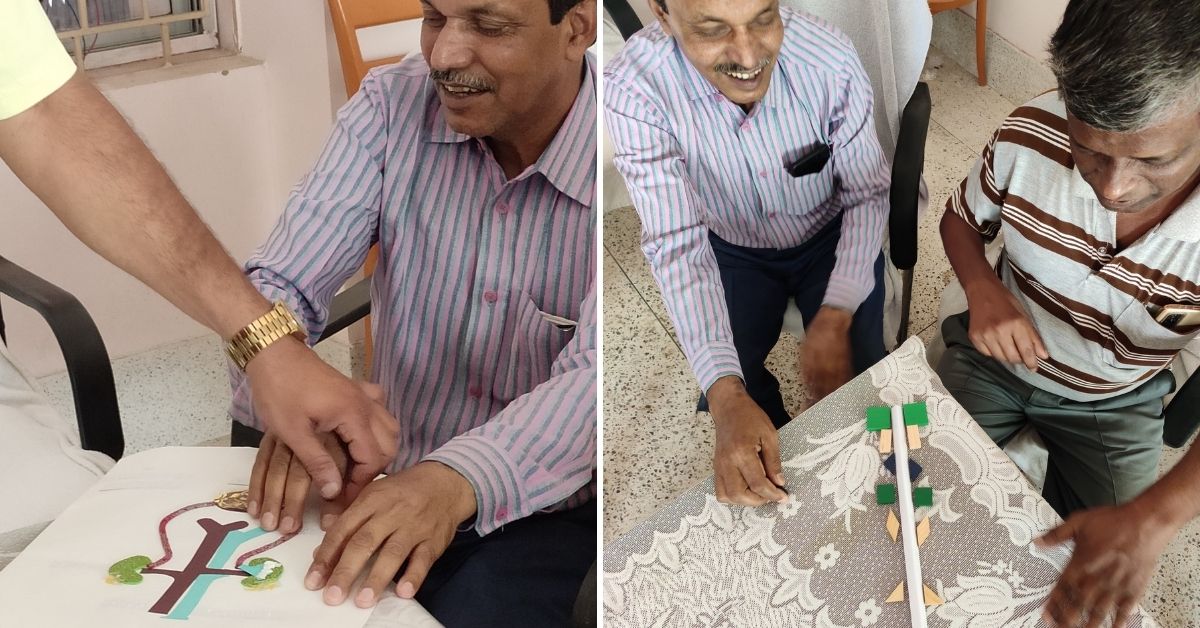Blind Entrepreneur Helps Thousands of Visually-Impaired Kids Build a Future In STEM
Karnataka entrepreneur Vidhya Y, who has been blind since birth, learned from her own struggles with her disability to empower thousands of visually impaired children with Vision Empower, an enterprise that encourages these students to pursue STEM education

Being blind never doused the fire within Vidhya Y, who always found joy in learning science, mathematics and technology.
Growing up, she was told that subjects like science and mathematics would be difficult to pursue due to her disability. But she says she never wanted to compromise on her interests, and was always ready to go the extra mile to achieve her dreams.
“Children who have disabilities like mine are not encouraged to pursue science. Instead, people suggest they opt for humanities or arts. It is mainly because there isn’t a well-designed curriculum set for students who are blind to learn the subjects efficiently,” Vidhya tells The Better India.
While a successful entrepreneur today, her journey wasn’t always easy, as she had to fight heavy stigma. But today, she has beaten all odds to study science and empower thousands of people with visual impairments through Vision Empower, a non-profit that offers effective learning in STEM courses to students with visual impairments.
The turning point
Vidhya, who was born blind, hails from Thirumagondanahalli, located on the outskirts of Bengaluru. She says that living in a small village made it even more difficult for her parents to raise a blind child, coupled with limited resources and facilities, as well as massive stigma.
“While growing up, people considered me different from others. It was very difficult for me to cope with all of it. Even though my parents didn’t know how to go about raising me, they wanted me to get a good education,” says the 28-year-old.
After completing her early education at a vocational training centre near her village, she joined a formal blind school in Bengaluru. “I did my schooling there from class 2 to class 7. That’s when I realised my love for mathematics and science,” she says.
“But when I expressed my interest in pursuing the subjects, I was advised not to. For students with visual impairments, there is an option to choose alternate non-science subjects after class 7. A majority opt for those, leaving just a few who go for science and maths,” she explains, adding that she joined a regular school after class 7.

She recalls that her parents tried to enrol her in several reputed schools, but none wanted to admit her. “I remember crying in most of the interviews for school admissions. I was young and wasn’t courageous enough to speak for myself, and my parents also were helpless,” says Vidhya, who was later enrolled in a school near her village.
While she loved maths and science, she says it wasn’t easy for her to study the subjects because of their visual nature. “Coming from a blind school, I didn’t know how to handle the situation. It was a very small school and I was an exception. So, I had to sit through all the classes completely clueless about what is being written or drawn on the board. In the initial days, I used to come back home and cry. So, my parents decided to arrange a private tutor for me, who would help me with the subjects after school,” she explains.
Eventually, things started working out, and she slowly started improving in her studies. “From class 8 till post-graduation, I hardly remember sleeping well. I had to spend extra hours after school and college to understand the concepts and to keep up with others. In class 10, I scored really good marks, and received a lot of media coverage for it. It was a turning point where everyone realised that I could really do it,” she adds.
So, after finishing her schooling, she joined a PUC, where she took commerce with mathematics. Later, she opted for Computer Science for her graduation, which she remembers as one of the most challenging periods in her education. “It involved a lot of programming, diagrams, lab work etc. I didn’t understand anything. But luckily, we found some volunteers from Canada who took classes for me after college via Zoom. It went on for three years, and I did well in the exams,” says Vidhya.
Vidhya then enrolled for her post-graduation in Digital Society Programming at IIIT-Bangalore, and passed out in 2017 with a gold medal. “During my course, I did an internship with Microsoft and it was an amazing experience. But after finishing the course, I wasn’t able to find a job, as nobody was ready to hire me even though I had a gold medal,” she says.
“I worked so hard and I didn’t want to compromise. I wanted to do something in my stream. That’s when I started thinking of starting something on my own,” says Vidhya.
In 2017, Vidhya launched Vision Empower with Amit Prakash, her professor at IIIT, and Supriya Dey, a research student at the institute.
A vision for the future

Vision Empower offers an accessible learning management platform to promote experiential learning of STEM subjects, computational thinking, and digital literacy, and also includes early childhood programmes.
“To promote STEM learning, we started by giving out textbooks to visually impaired children with diagrams they could understand by touching and feeling. The theory is in braille and the diagrams are in 2D,” says Vidhya, adding that they started with providing these materials to students from class 4 to class 6, but have now expanded to include kids from class 1 to class 10.
Another initiative is a teachers training programme to learn new concepts and innovative tools. “One of our biggest initiatives is computational thinking, which is in partnership with Microsoft. It is a new method being used across the world, and it’s a good time to start for people with visual impairments. It’s a set of methods and practices for solving complex problems and presenting solutions in a way that a computer can also understand,” she explains.
For the digital literacy programme, they have developed their own tools to teach the kids using different play-based methods, she says. “We have kids from across the country. Ever since the pandemic started, we have been doing the training sessions online,” she adds.

The technology arm of Vision Empower — Vembi Technologies — has developed a learning management system named ‘Subodha’, where all study material is made accessible to teachers and children with visual impairments. Vidhya adds, “We have also designed an affordable braille book reader for children called ‘Hexus-Antara’.
Bhagyashree Parappagulla, a teacher at the Govt Blind School, Devangeree, says, “Since 2018, I have been attending Vision Empower’s training programmes for teachers working with disabled children across Karnataka. These trainings are focussed on how to handle subjects like science and mathematics, and teach students easily.”
“Ever since the pandemic began, they have been helping us by conducting zoom classes and training us in how to teach kids online, without physical proximity. They also sent us teaching materials like textbooks and different types of teaching aids that enrich the learning process,” adds the teacher, who is also blind.
“These programmes are clearly helping our students in developing interest in maths and science,” she notes.
Vidhya says that the enterprise is currently working with over 80 schools across six states. “We have directly partnered with the governments of Karnataka, Tamil Nadu, Kerala, Tripura, Delhi and Gujarat. This year, there have been around 1,800 direct and indirect beneficiaries with the help of hundreds of volunteers,” she says, adding that the organisation is mostly funded by corporations like Microsoft, Wipro, Elektrobit India, Cognizant etc, as well as individual sponsors.
“I had experienced a lot of challenges while growing up. The system hasn’t changed much, where visually-impaired children are still discouraged from taking up STEM subjects. I want to help them, their parents, and teachers to explore all opportunities, and to create awareness in this regard,” says Vidhya.
For more information, you can visit their website or Facebook page.
(Edited by Divya Sethu)
If you found our stories insightful, informative, or even just enjoyable, we invite you to consider making a voluntary payment to support the work we do at The Better India. Your contribution helps us continue producing quality content that educates, inspires, and drives positive change.
Choose one of the payment options below for your contribution-
By paying for the stories you value, you directly contribute to sustaining our efforts focused on making a difference in the world. Together, let’s ensure that impactful stories continue to be told and shared, enriching lives and communities alike.
Thank you for your support. Here are some frequently asked questions you might find helpful to know why you are contributing?


This story made me
- 97
- 121
- 89
- 167











